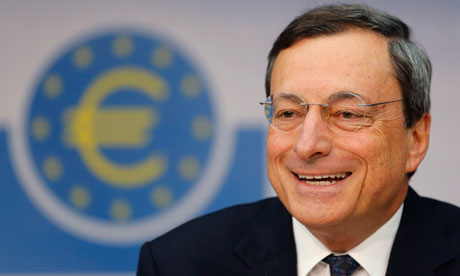Analysts have doubts about the mechanics of Draghi's plan and the logic behind his strategy. Photograph: Michael Probst/AP
Mario Draghi has done his bit. As promised, the European Central Bankwill wade into the financial markets in an attempt to hold together the single currency until the politicians get their act together and agree on steps towards closer political union.
That's the good news. The bad news is that the Draghi blueprint will not be enough to save the euro. The impression left by Thursday's announcement on unlimited bond buying was that it was technically sound but based on flawed economics.
The ECB will deploy its firepower to bring down interest rates on the borrowings of troubled members of the single currency provided the governments of the supplicant states agree to "strict and effective" conditions. Beneath his urbane exterior Draghi is one tough cookie and he has forced his plan through the ECB despite the opposition of the Bundesbank, something that would have been seen as impossible a few months ago.
The Germans threw their toys out of the pram after Draghi's announcement, making clear they thought the blueprint could be costly for European – aka German – taxpayers. The Bundesbank's Jens Weidmann was a lone voice at the ECB council meeting and Draghi now has the authority to act. Make no mistake, the ECB has very deep pockets.
Immediate action is out of the question. The ECB will only move when countries have signed up to their structural adjustment programmes, and that will take time. When the bond buying begins, the ECB will remove money from elsewhere in the system to ensure there is no increase in money supply. This process, known as sterilisation, is a small victory for the Bundesbank.
Markets worried that Draghi would deliver less than he has been promising. That he lived up to expectations meant the financial markets rallied, but even before Draghi had finished speaking analysts were expressing doubts both about the mechanics of the plan and the logic behind the strategy.
The ECB's president brushed aside questions at his press conference about what he would do if Spain, for example, signed up to "strict and effective" conditions to trigger bond buying but then decided the conditions were too difficult to implement. In those circumstances, would the ECB really start selling Spanish bonds at a heavy loss? Gary Jenkins of Swordfish Research said this would be like the ECB putting a gun to its own head and pulling the trigger.
A bigger problem is the economic thinking behind the plan. The Organisation for Economic Cooperation and Development in Paris said on Thursday that Italy's economy will shrink by 2.4% this year. In Spain youth unemployment is more than 50%, the banks are tottering under the weight of bad debts from a bombed-out housing market, and private capital is leaving the country at an alarming rate. Greece's economy is 20% smaller than it was four years ago.
Put simply, Greece is in depression, Spain on the brink and Italy heading that way.
The "rescue" plan involves governments in Rome and Italy driving their economies deeper into depression to reduce the interest rates they pay on their borrowing. The ECB seems to think that the reason investors are giving Italy and Spain the cold shoulder is that they are not cutting hard enough, fast enough. Steeped in economic orthodoxy, Draghi makes George Osborne look like a paid-up member of the Maynard Keynes appreciation society.
The reason investors demand high interest rates when they lend to Italy and Spain is their concern about the impact of permanent recession on public finances and banks. A rescue plan that has at its core more demand-destroying measures will do more harm than good.
To sum up, Draghi has bought Europe a bit more time. The can has been kicked a few metres down the road. He has done so by incurring the wrath of the Bundesbank and will know that if this fails, there is little more the ECB can do.
Fail it almost certainly will, because success means more than knocking half a percentage point off Italian and Spanish bond yields. It means solving the growth and competitiveness problems of the weaker eurozone countries and convincing their increasingly alienated people that Europe has more to offer than endless misery.








 (Credit: Jim Young/Reuters)
(Credit: Jim Young/Reuters)

 It wasn’t even the best speech of the week, never mind his career.
Instead, President
It wasn’t even the best speech of the week, never mind his career.
Instead, President  Companies hired 96,000 workers in August, down from 141,000 in July, the Commerce Department said in its widely-watched report. The tally lagged the 130,000 forecast by economists. A separate survey showed the unemployment rate fell to 8.1pc from 8.3pc, though economists said much of that was down to people giving up the search for work.
Companies hired 96,000 workers in August, down from 141,000 in July, the Commerce Department said in its widely-watched report. The tally lagged the 130,000 forecast by economists. A separate survey showed the unemployment rate fell to 8.1pc from 8.3pc, though economists said much of that was down to people giving up the search for work.



